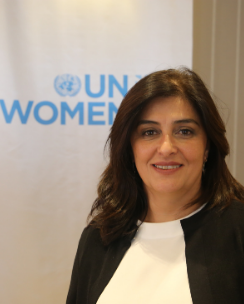Expert’s Take: “The COVID-19 pandemic has shed light on the fragility of the achievements of the Beijing Declaration and Platform for Action”
Date:
About the author

Zeliha Ünaldı is the Programmes Manager of UN Women Turkey. From 2014-2018 she worked as the Gender Specialist of the Resident Coordinator’s Office in Ankara where she provided technical and policy support for the UN Country Team in Turkey.She is a graduate of the Gender and Women’s Studies Programme of the Middle East Technical University. She has more than 20 years’ experience in the field of gender equality and women’s empowerment. She has worked for governmental, non-governmental and international organizations.
If I started the story of my life with the following sentence, it would not be wrong: “I got on a train and my life changed.”
25 years ago, I got on the Trans-Siberia train going from Warsaw to Beijing to participate in the Fourth World Conference on Women. I was a postgraduate student and research associate in the recently established Middle East Technical University (METU) women’s studies programme.
I participated in the Beijing Express Programme on behalf of METU with the support of the Turkish Cooperation and Coordination Agency (TİKA). The programme was organized with support from the United Nations Development Programme (UNDP).
We were together with more than 200 women from 29 countries, representing non-governmental organizations. We were all determined to change the world.
All those emotions we went through during that eight-day journey can be summarized by the quote of the renowned feminist, Sue Vinson: “We are many but one, look at the world through the eyes of women”. That was also the main theme of the Fourth World Conference on Women in 1995 as well as the main theme of the civil society forum.
“We shall celebrate our diversity and uniqueness and look at the world through the eyes of women.” With such spirit, the Beijing Declaration and Platform for Action emerged at the end of the conference and the civil society forum, which were attended by government representatives This declaration has been the most widely accepted roadmap in the world to date, with 189 governments having committed to implementing it. Twenty five years later, it is still the most visionary roadmap to achieve gender equality. If the 12 critical areas of concern that make up the Platform for Action were written today, they would be the same.
But being visionary is not only about drawing a roadmap. It is also about showing how persistent the problems are, which is another characteristic of the Beijing Platform for Action.
Since 1995 many important changes have occurred. Women’s movements across the world as well as in Turkey have had many successes, including through collaboration with governments. This is especially true in the areas of access to education and literacy, where there are significant improvements in favour of women. There have also been important declines in maternal death and infant mortality rates since 1995. Particularly in some countries, social protection mechanisms have been strengthened, parental leave is supported and attention has been drawn to unpaid care and domestic work. In 131 countries, serious amendments have been made in laws to support women’s access to health and education and to support their political participation. These rights have been taken under constitutional protection and new laws have been drafted.
That said, there are still some areas of concern. For example, less than two thirds of women can participate in labour force worldwide. Nearly 400 million women struggle with extreme poverty. Every year, 243 million women are subjected to violence by an intimate partner. Seventy-five percent of seats in the parliaments and 73 percent of executive positions are still held by men. Women do three times more unpaid care work than men all over the world, and the average of this ratio even goes up to four times in Turkey. Those main issues that were left unfinished by the Beijing Platform for Action were brought forward again and have been integrated into the Sustainable Development Goals agenda.
Being one of the 189 countries that have committed to the Beijing Declaration, the Turkish government initially took all the actions it had committed to. One of them was to remove the reservations in the Convention on the Elimination of All Forms of Discrimination against Women (CEDAW) and make amendments to its domestic law in accordance with CEDAW, as well as in accordance with the Beijing Declaration. Later on, as a result of the efforts of women’s movement in collaboration with the government, the Turkish government amended its civil code, criminal code and labour law. Since 1995, the legal arrangements for gender equality were created in Turkey.
But the COVID-19 pandemic has shed light on the fragility of many of these achievements in Turkey and across the world. Studies show that women’s participation in the labour force has been affected more than men’s during the COVID-19 period and this also applies to the levels of poverty.
To eliminate the risks, there are important issues we must discuss in detail in the anniversary of Beijing, among which is the spirit of the 1995, namely: “being many but one”.
As UN Women Turkey, we aim to rejuvenate this spirit of unity by reaching as many women, men, girls and boys as possible. Because, especially in such times that we are shaken by the crises, we believe that we need this unity and solidarity more than ever and in a more committed way. We will continue to share this spirit with women and girls, men and boys who did not have the opportunity to get on that train.